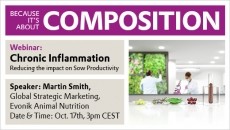Aller Aqua phases out the use of South American soy

“We already started phasing out South American soy in 2019, but, from this year, our four European factories will exclusively source soy regionally,” said Henrik Halken, vice president, Aller Aqua Group.
Aller Aqua said it wants its customers to have high quality feeds with stable performance, but also feeds with minimal environmental impact.
The company said the sourcing move is in line with EU initiatives aimed at supporting increased production of protein crops to boost self-sufficiency in that sector in the EU-27 and, thereby, reduce EU dependency on soy product imports from South America, which are linked to deforestation.
“It is better to source close to factories, we try to buy as locally and regionally as possible, to reduce transport and to [have greater knowledge about] our raw materials. We do that with wheat, we do that with rapeseed oil, and other products,” Halken told us.
Aller Aqua uses soy products such as soy protein concentrate and soybean meal in its formulations. Production volumes of those essential raw materials are, of course, significantly larger in South America, but production of protein raw materials will only continue to expand in Europe, he said.
Its four European factories started the switch to buying in regionally produced soy in 2019, with 50% of those needs covered last year. “You need that transition period to find out which sources you can trust, to test [raw materials].”
Won’t it be more expensive to source regionally, though? “Yes, it could be a little more expensive. But with production increasing, those costs will be levelled out at a certain time," said Halken.
Insects, PAPs and pea protein
To ensure the largest possible positive impact on its environmental footprint, the group said it is continuously looking at its raw material portfolio. For many years, it has been using animal by-products or processed animal proteins (PAPs) in its formulations, which it said that, besides reducing waste, maintain the feed quality.
“We believe that the [use of such animal by-products] is very sustainable. They are good raw materials, they are highly digestible.”
But not all markets accept such feed inputs, said Halken. “We operate in 60 different countries, and we adapt to different market requirements.”
Aller Aqua is also involved, he said, in a research project with Danish insect start-up, ENORM.
And it also operates a pea derived protein production plant in Germany. “We are producing a product there with 75% protein content, and that is something we can used to replace fishmeal.”

















